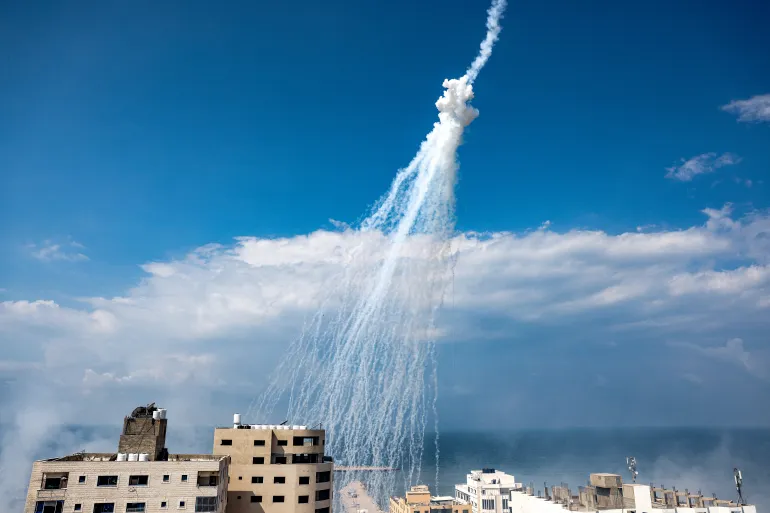Human Rights Watch has reported that Israel’s military has recently employed white phosphorus munitions in both Lebanon and Gaza.
The organization confirmed on Thursday that the use of these munitions by Israel during military operations in Gaza and Lebanon endangers civilians by exposing them to the risk of severe and enduring injuries.
Rights groups corroborated their findings by analyzing videos recorded in Gaza and Lebanon on October 10th and 11th, 2023. These videos captured “multiple instances of artillery-fired white phosphorus airbursts over the Gaza City ports and two rural locations along the Israel-Lebanon border.”
Furthermore, the organization shared links to two social media videos, which it asserted depict the use of “155mm white phosphorus artillery projectiles, seemingly employed as smokescreens, markers, or signals.”
Lama Fakih, HRW’s director for the Middle East and North Africa (MENA), expressed in a statement, “The use of white phosphorus in densely populated urban areas through airburst tactics is in violation of international law, as it can lead to the destruction of homes and inflict severe harm upon civilians.”
On Friday, the Israeli military categorically refuted all the allegations put forth in the HRW report regarding the use of white phosphorus bombs during its recent Gaza conflict.
In 2013, Israel’s military said it was phasing out white phosphorus smokescreen munitions used during its 2008-2009 offensive in Gaza, which drew war crimes allegations from various rights groups.
The Military at the time did not say whether it would also review use of weaponized white phosphorus, which is designated to incinerate enemy positions.
What is white phosphorus bomb?
A white phosphorus bomb is a hazardous chemical substance known for its ability to cause severe burns to human skin and disintegrate tissues deep within the body. This substance is synthetically derived from phosphate rocks and typically exists in a waxy solid state that may appear white, yellow, or colorless and carries a distinct garlic-like odor.
Moreover, white phosphorus is highly combustible and has the potential to spontaneously ignite upon exposure to oxygen at temperatures just 10 to 15 degrees above room temperature. While it can be used in the production of fertilizers, food additives, and cleaning agents, it is also recognized for its destructive and lethal characteristics when weaponized.
Furthermore, it finds application in military arsenals for purposes such as signaling and concealing, or as a weapon intended to ignite fires that can harm people and objects. It possesses a potent incendiary capacity, capable of inflicting severe burns on individuals and setting ablaze structures, fields, and various civilian assets nearby.
The utilization of white phosphorus in Gaza, one of the most densely populated regions globally, heightens the danger to civilians. Nonetheless, the use of such a substance in Gaza, an area characterized by extraordinary population density, contravenes the prohibition within International Humanitarian Law that forbids exposing civilians to unnecessary risks.
Is it prohibited?
White phosphorus munitions are inherently legal weapons that can be employed against the enemy in accordance with standard laws of target. However, like any other legally accepted munitions, they can also be misused in unlawful ways.
Moreover, it is not prohibited as a chemical weapon under international agreements, but it has the potential to inflict severe burns and initiate fires.
The very fact that international humanitarian law does not specifically prohibit phosphorus weapons does not imply that any specific use of weapons containing this substance is legal. International humanitarian law unambiguously mandates the safeguarding of civilians from the consequences of all military actions.
As far as Protocol III of the Convention on the Prohibition of Use of Certain Conventional Weapons, white phosphorus is considered an ‘incendiary weapon.’

